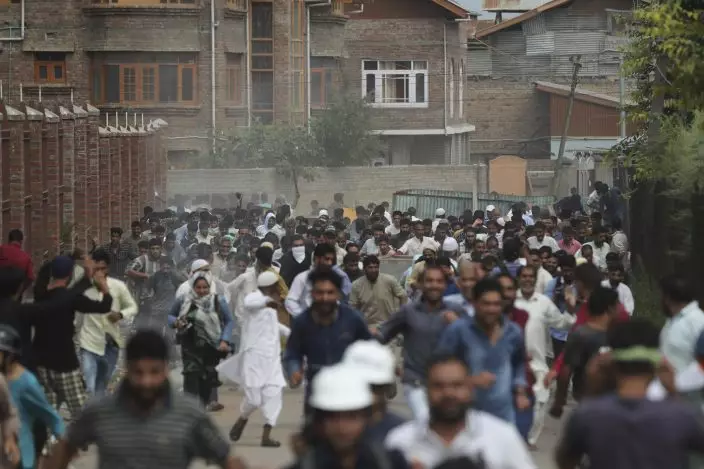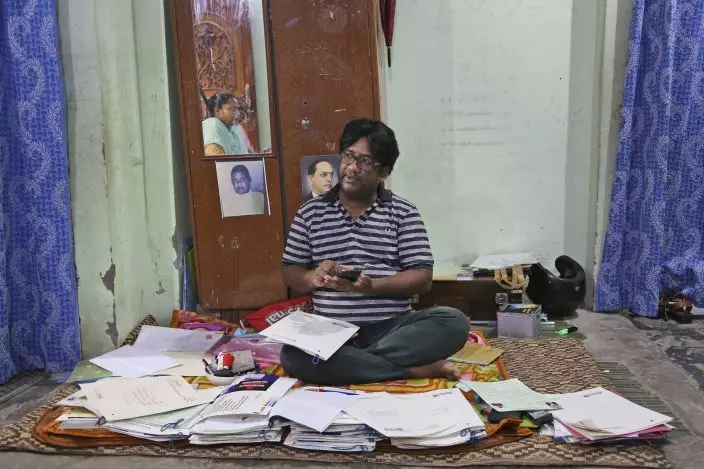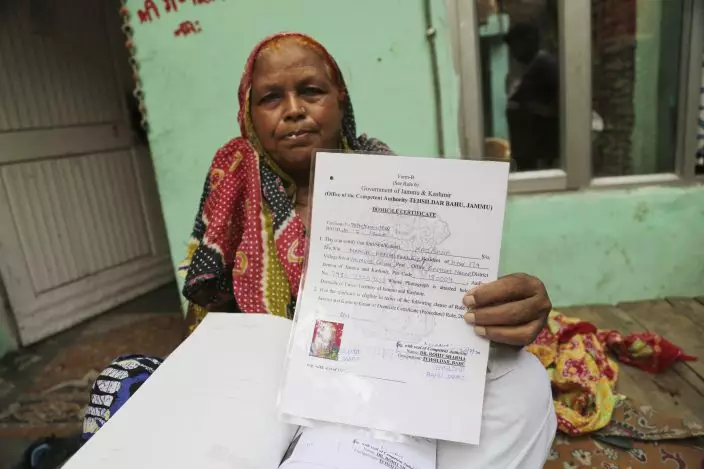For almost a century, no outsider was allowed to buy land and property in Indian-controlled Kashmir.
That changed Aug. 5 last year when India's Hindu nationalist government led by Prime Minister Narendra Modi stripped the Himalayan state’s semi-autonomous powers and downgraded it to a federally governed territory. It also annulled the long-held hereditary special rights its natives had over the disputed region’s land ownership and jobs.
Since then, India has brought in a slew of changes through new laws. They are often drafted by bureaucrats without any democratic bearings and much to the resentment and anger of the region’s people, many of whom want independence from India or unification with Pakistan.

FILE- In this Aug. 30, 2019, file photo, Kashmiris protesting against Indian government stripping the Himalayan state’s semi-autonomous powers run for cover as Indian police use tear gas and pellets to disperse them in Srinagar, Indian controlled Kashmir. A year after India ended disputed Kashmir's semi-autonomous status and downgraded it to a federally governed territory, authorities have begun issuing residency and land ownership rights to outsiders for the first time in almost a century. Many Kashmiris view the move as the beginning of settler colonialism aimed at engineering a demographic change in India’s only Muslim-majority region. (AP PhotoMukhtar Khan, File)
A year later, things are swiftly changing on the ground.
Under a new law, authorities have begun issuing “domicile certificates” to Indians and non-residents, entitling them to residency rights and government jobs. Many Kashmiris view the move as the beginning of settler colonialism aimed at engineering a demographic change in India's only Muslim-majority region.
Amid growing fears, experts are likening the new arrangement to the West Bank or Tibet, with settlers — armed or civilian — living in guarded compounds among disenfranchised locals. They say the changes will reduce the region to a colony.

Radhika Gill, center, with her father Bhittu Gill and mother Shaloo Gill display their domicile certificates in Jammu, India, July 30, 2020. A year after India ended disputed Kashmir's semi-autonomous status and downgraded it to a federally governed territory, authorities have begun issuing residency and land ownership rights to outsiders for the first time in almost a century. Documents accessed and reviewed by The Associated Press show at least 60,000 have gained residency in the last two months including Hindu refugees, Gurkha soldiers and bureaucrats. (AP PhotoChanni Anand)
“Given the history of Indian state intervention in Kashmir, there are efforts to destroy the local, distinctive cultural identity of Kashmiris and forcibly assimilate Kashmiri Muslims into a Hindu, Indian polity,” said Saiba Varma, an assistant professor of cultural and medical anthropology at the University of California, San Diego.
Residency rights were introduced in 1927 by Kashmir’s Hindu king, Hari Singh, to stop the influx of outsiders in the former princely state. Historians say the maharaja brought land ownership rights on the insistence of powerful Kashmiri Hindus. They continued under Indian rule after 1947, as part of Kashmir’s special status.
The new law, introduced in May amid the coronavirus lockdown, makes it possible for any Indian national who has lived in the region for at least 15 years or has studied for seven years and taken certain exams to become a permanent resident in Jammu-Kashmir. The Indian government is ensuring the process is fast-tracked and has introduced a fine of 50,000 rupees ($670) to be deducted from the salary of any official in the territory who delays the process.

Gharu Bhatti, an activist working for the welfare of lower caste Hindus, shows his paperwork in Jammu, India, July 30, 2020. A year after India ended disputed Kashmir's semi-autonomous status and downgraded it to a federally governed territory, authorities have begun issuing residency and land ownership rights to outsiders for the first time in almost a century. Bhatti said that the domicile law ended their "slavery." Bhatti's parents were among some 270 sanitation workers brought by the government to Jammu from neighboring Punjab state in 1957. Since then, their numbers have grown to nearly 7,000, said Bhatti, who is among the first few dozen from his community to get the region's residency. Documents accessed and reviewed by The Associated Press show at least 60,000 have gained residency in the last two months including Hindu refugees, Gurkha soldiers and bureaucrats. (AP PhotoChanni Anand)
Those receiving domicile certificates include Hindu refugees from Pakistan following the 1947 bloody partition of the subcontinent, Gurkha soldiers from Nepal who had served in the Indian army, outside bureaucrats working in the region and some marginalized Hindu communities. Even the natives must apply for residency, otherwise they risk losing government jobs and welfare benefits.
About 400,000 people have been given domicile certificates in over a month, Pawan Kotwal, a top Indian official was quoted on Saturday by The Tribune, a north Indian English-daily. Officials have not not said how many of them are locals and have generally been tight-lipped about the process.
Navin Kumar Choudhary, a senior bureaucrat from eastern Bihar state, was the first high-profile outsider to get residency on June 26. While Kashmiris were aghast as Choudhary's picture displaying the certificate went viral on social media, many in Hindu-majority southern Jammu rejoiced.

Kashmiri artist Tabish Haider paints inside his house in Srinagar, Indian controlled Kashmir, July 22, 2020. A year after India ended disputed Kashmir's semi-autonomous status and downgraded it to a federally governed territory, authorities have begun issuing residency and land ownership rights to outsiders for the first time in almost a century. Many Kashmiris like Haider view the move as the beginning of settler colonialism aimed at engineering a demographic change in India’s only Muslim-majority region. “They have recently introduced a law which is a domicile law, which basically says that we as Kashmiris, who have been living here for past many generations, they have to prove their own identity in their own land. So how can a piece of paper prove my identity in my own land? Haider asked. (AP PhotoMukhtar Khan)
Gharu Bhatti, an activist working for the welfare of lower caste Hindus in Jammu, said the law ended their “slavery.”
Bhatti’s parents were among some 270 sanitation workers brought by the government to Jammu from neighboring Punjab state in 1957. Since then, their numbers have grown to nearly 7,000, said Bhatti, who is among the first few dozen from his community to get the region’s residency.
“Now our kids have a future. They can be whatever they want to be. We will have choices to make now,” he said.

Krishna Singh shows her domicile certificate in Jammu, India, July 27, 2020. A year after India ended disputed Kashmir's semi-autonomous status and downgraded it to a federally governed territory, authorities have begun issuing residency and land ownership rights to outsiders for the first time in almost a century. Documents accessed and reviewed by The Associated Press show at least 60,000 have gained residency in the last two months including Hindu refugees, Gurkha soldiers and bureaucrats. (AP PhotoChanni Anand)
But even some Hindu groups in Jammu have resented the law, expressing fears of job and business losses to outsiders.
Authorities have called the new residency rights an overdue measure to foster greater economic development by opening up the region for outside investments. Girish Chander Murmu, the region’s top administrative official, in late June told reporters that the law was aimed at bringing economic prosperity and dismissed any fears of demographic change as “propaganda.”
Many natives in Kashmir are skeptical of such clarifications and liken them to assurances Indian authorities made prior to the Aug. 5 decision when they said no constitutional changes were planned.
Human rights activists, pro-freedom leaders and Kashmiri residents have long feared that giving outsiders the right to buy land and property could further plunge the region into chaos and set in motion a plan to crush the identity of its people.
“We have always been fed lies and deceived by gimmicks of development and democracy by the Indian state,” said Shafat Ahmed Mir, a university student. “As a people, it is the most critical time in our history and we have never faced such an existential threat before.”
Kashmir’s fury at Indian rule has been long seething.
The stunning mountain region has known little but conflict since 1947, when British rule of the subcontinent divided the territory between the newly created India and Pakistan.
After a series of political blunders, broken promises and a crackdown on dissent, Kashmiri separatists launched a full-blown armed revolt in 1989, seeking unification with Pakistan or complete independence. India dubbed the armed rebellion terrorism abetted by Pakistan, a charge Islamabad denies.
Tens of thousands of civilians, rebels and government forces have been killed in the conflict in the last three decades.
Since the early 1950s, Hindu nationalists, including Modi’s Bharatiya Janata Party, have been advocating a solution in India’s favor by neutralizing Kashmir's Muslim majority inhabitants through settlement of Hindus from other parts of the country.
“The Indian Hindu right-wing wants a demographic solution to Kashmir, but their policies are sowing seeds for a new conflict, possibly one that will lead to unending bloodshed and lead to destabilization of the entire region,” said Mohamad Junaid, a Kashmiri political anthropologist.
The militarization of the region has increased under Modi, and in July the government eased rules for Indian soldiers to acquire land in Kashmir and construct “strategic areas” seen as settlements by the natives.
Kashmir’s oldest and main pro-India political party, the National Conference, slammed the move as a mission for a "major land grab” that could “turn the entire region into a military establishment.”
With India allowing outsiders to become residents, many worry such a move could alter the results of a plebiscite if it were to ever take place, even though it was promised under the 1948 United Nations resolutions that gave Kashmir the choice of joining either Pakistan or India.
Kashmiri lawyer Mirza Saaib Beg said the newly drafted residents will acquire rights over the years that can complicate the resolution.
“Historical precedent shows that Kashmiri fears are well founded,” said Varma, the anthropologist. The legal changes, she said, are “about a project to annihilate people.”


